Life After Diagnosis
- PublishedSeptember 5, 2024
- ByCadence Paramore
- Posted in Featured Articles, Help and Coping, Newsletter, Stories, Stories - In Loving Memory, Stories - Survivor Stories
- Share
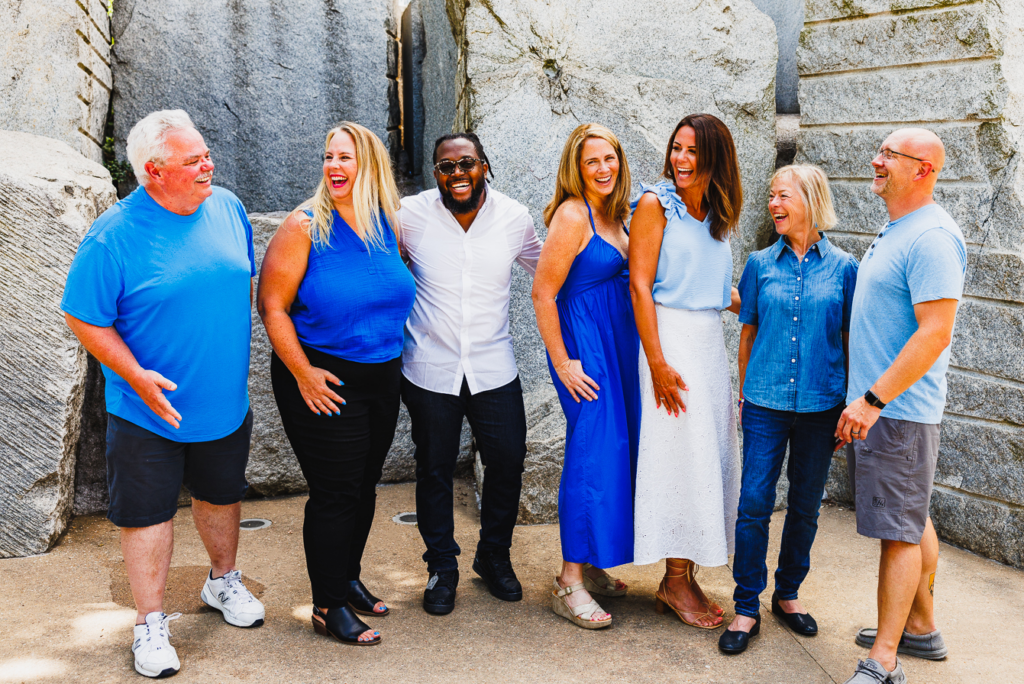
We know there is nothing that can take away the pain and grief of a cancer diagnosis, and rarely there are few words that can make it any better, but these reflections of Life After Diagnosis encompass how cancer can only take what we allow it to– and they cannot take away a life well lived with people well loved.
Jill Hart – Patient & Survivor
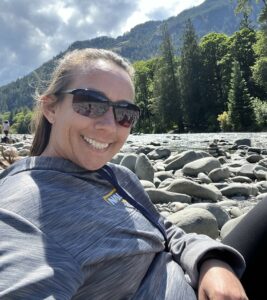 “I wish the age would get lowered for getting colonoscopies.”
“I wish the age would get lowered for getting colonoscopies.”
Jill Hart was only 41 and had no symptoms when she was diagnosed with colon cancer in October of 2022. Two weeks before she was diagnosed, she had trouble passing bowel movements. Stool softeners and colonoscopy prep did nothing to help, so she went to the emergency room. A CT scan found a tumor that was blocking Jill’s bowel movements. It had also spread to her liver. She did four different kinds of chemo over three months, and in March of 2023, Jill had the tumor and over half of her liver removed.
“The hope was that I could do clean-up chemo after, and that would be it, but they found a spot on my pelvis during surgery. That completely changed my treatment plan. I have been doing chemo every other week since April. My numbers are going down, but recently they started going up again. I’m currently getting new scans and bloodwork done to decide what treatment plan will come next.”
“I have good days and bad days, but I have figured out my routine and don’t plan anything on the days I won’t feel good. I take advantage of the good days. I have three kids (18, 16, and 13), and their sports and school activities keep me going.”
Philip Stinson – Survivor
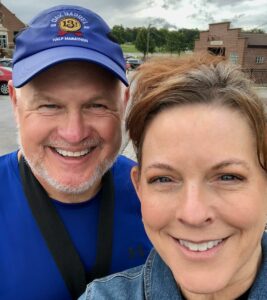 “I am living my best life 17 years cancer-free and happy,” shares Philip Stinson, a retired Virginia State Trooper who was diagnosed with stage III colon cancer at the age of 45 in April of 2007.
“I am living my best life 17 years cancer-free and happy,” shares Philip Stinson, a retired Virginia State Trooper who was diagnosed with stage III colon cancer at the age of 45 in April of 2007.
Philip had some symptoms, but he attributed them to probable hemorrhoids. However, when a friend of his passed away from colon cancer, Philip decided to get a colonoscopy. When he awoke after his colonoscopy, his GI told him that he felt positive, biopsy pending, that Philip had colon cancer.
“I received radiation and chemotherapy before surgery, which shrunk my tumor to stage II. After my tumor was removed, I received an additional six months of chemotherapy. My tumor was large and sat very low in the colon. As a result, my ostomy surgery was not reversible. I had a long road to recovery after surgery. As a result of that surgery, I am alive. I am thankful for it every day.”
“I decided to take my life back and get into shape. I had gained around 60 lbs and felt miserable. I’m sure the weight gain was in part due to depression. Cancer had taken many things away from me, but I wasn’t going to allow it to take anymore! I started walking in my neighborhood each day. It was no easy task as I have neuropathy in my feet from all the chemo. I worked my way up to running/walking at intervals. Soon I had my sites set on my first 5K, and the rest is history!”
“I have completed around 20 half marathons and too many 5Ks to count. I am not fast, but I show up and love running. I hope to inspire others who have ostomies. And as a result of my running and social media, I reconnected with a long-lost love!”
Londa Bridges – Survivor & Mother
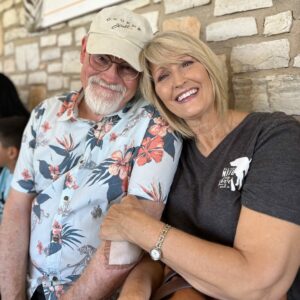 “Colon cancer is detectable and curable if caught early. We want detection protocols to improve and primary care physicians to be better educated in signs and symptoms for early detection!”
“Colon cancer is detectable and curable if caught early. We want detection protocols to improve and primary care physicians to be better educated in signs and symptoms for early detection!”
Londa is all too familiar with how much colon cancer takes, not only as a colon cancer survivor herself but as a mother who lost her son at age 29 to colon cancer.
“In early 2006, at age 47, my family noticed a difference in my endurance. I also would occasionally notice a lump in my side. After about a month, I made an appointment to see my primary care physician. By the time we got in, the lump was gone, but our physician said that the next time the lump occurs to come see him. A few weeks later, it was back, and we were immediately sent to the hospital.”
“That Friday after a colonoscopy, we knew it was cancer. I had surgery on Monday and, following recovery, began six months of chemotherapy.”
Then, in 2014, Londa’s 28-year-old son, Brent, noticed a blockage in his intestines. After three months of her and her husband trying to get their GI clinic to do a colonoscopy on someone so young, they finally agreed. What eventually wore them down was Londa not taking “no” for an answer.
“His blockage was in his rectum and prevented the scope from even passing through to the colon. We began what we thought was a familiar path in treatment. However, his cancer was an aggressive mutation. We lost him just one week after his 29th birthday.”
“When Brent was diagnosed,” says Barry Bridges, Londa’s husband, “we immediately scheduled his sisters for colonoscopies. Brooke (age 30) had nine polyps, three of which were pre-cancerous. Brianna (age 24) had three polyps. Brent literally saved his sister’s lives.”
“Today, we work to educate others and bridge gaps in detection and education.”
Kati Hook – Wife & Caregiver
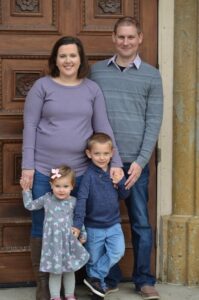 Kati Hook shares her late husband’s journey with colon cancer and why her family participates in Get Your Rear in Gear in his honor.
Kati Hook shares her late husband’s journey with colon cancer and why her family participates in Get Your Rear in Gear in his honor.
“Brad was diagnosed with stage IV colorectal cancer with metastatic disease to the liver in 2018. He was 32, and we had a 1-year-old and a 3-year-old at the time. He fought courageously for almost 3 years but passed away at age 35 in 2021. Brad never let cancer slow him down and was our strength in this journey. We did absolutely everything we could to help him beat this disease . . . Walking, in particular, was a therapeutic superpower for Brad as he battled colorectal cancer. He walked 10,000+ steps most days to help him keep up the fight and refocus.”
Brad created a CaringBridge account where he documented his journey with colorectal cancer to keep family and friends updated, as well as for his children to someday read. One of Kati’s favorite entries of his is this:
“Moving along, [my children] are going to someday read my CaringBridge, and when they do, they will know that their daddy is one hell of a beast that pushed through treatment after treatment without complaint. They will recall the crazy amount of walking I would do and refusing to let my chemo infusions hold me back. And, amongst other things, getting up on Saturday and Sunday mornings with everyone else during my chemo weeks to be with them and make them a delicious breakfast, play video games with them, and just enjoy the day with them. They will know that I somehow managed to work full-time throughout all of this which helped us have a wonderful house and go on fun vacations together. They will know that Daddy decided to get a permanent colostomy to get rid of a tumor, with the only thought being that he loves his kids and family so damn much that he will do anything to beat cancer and continue to live life. But most of all, they will know that I refused to let cancer dictate my life or think it was going to beat me, because it won’t, and I will continue to defy the statistics no matter what it takes for me to do it.”
“So we walk for Brad. To honor and remember him. To walk as he did and to never give up. To raise awareness and help others.”
Jill Hart has good days and bad days, but she lives for her three kids and their lives, which helps to keep her fighting.
Philip stopped allowing his cancer to take away his mental health, which was impacting his physical health. Now, he’s “living [his] best life 17 years cancer-free and happy.”
Because of Londa Bridges’ battle with colon cancer, she advocated for her son, Brent’s, diagnosis. And because of his diagnosis, Brent’s two sisters are alive and healthy.
Kati Hook’s husband, Brad, summed up his life after diagnosis perfectly, and we’d like to finish this with his words:
“I want people to know that no matter how big the odds, no matter how big the obstacle, there is a level of strength and determination inside of you that you may not know about until you are up against a wall and truly need it. Never, and I mean never, give up. Cancer has forced me to live life to its fullest because I am not guaranteed, nor is anyone, tomorrow. As each day passes, I learn what it means to live life even more. So if I am going to “thank” cancer for anything, it is my newfound appreciation for life.”